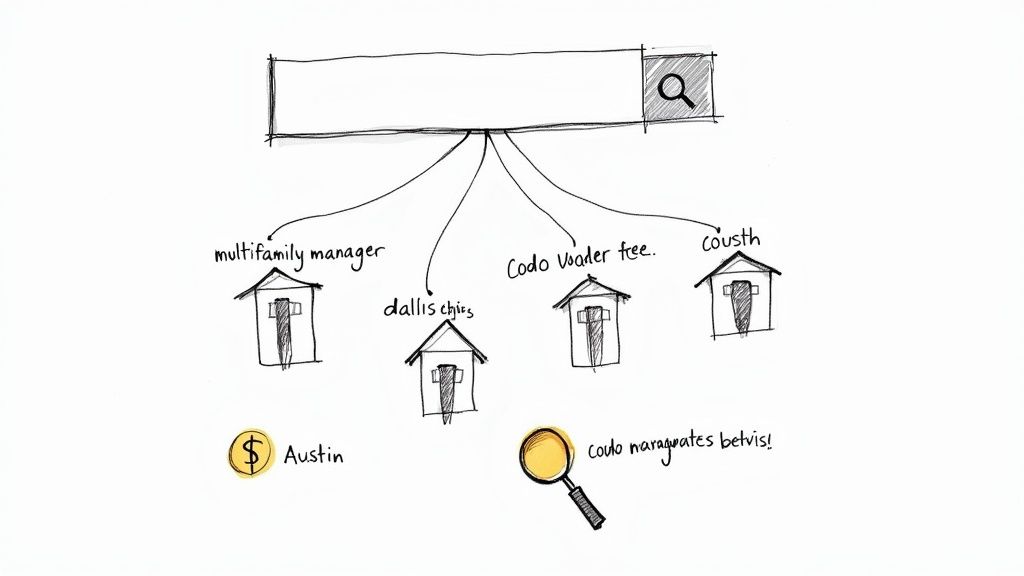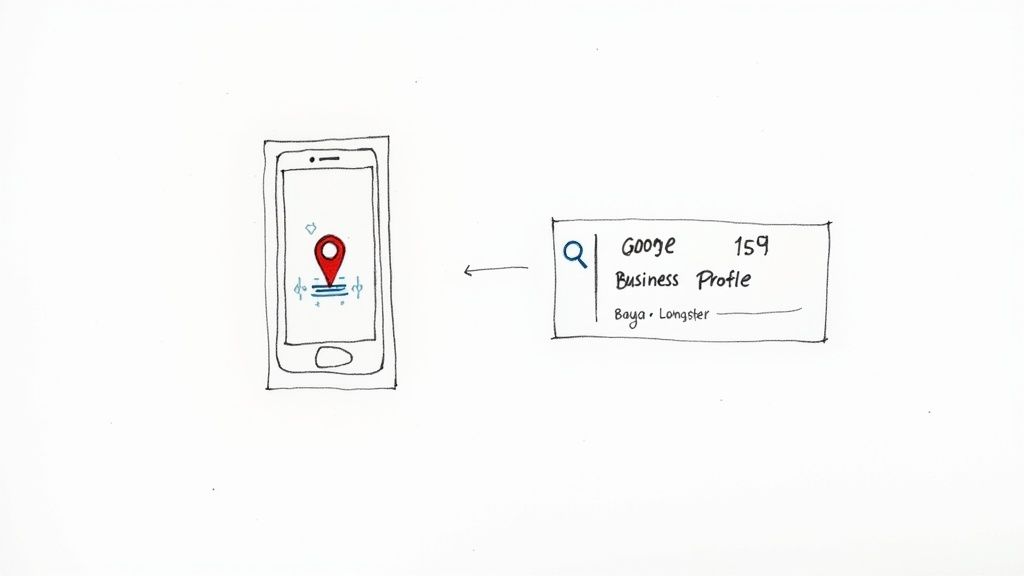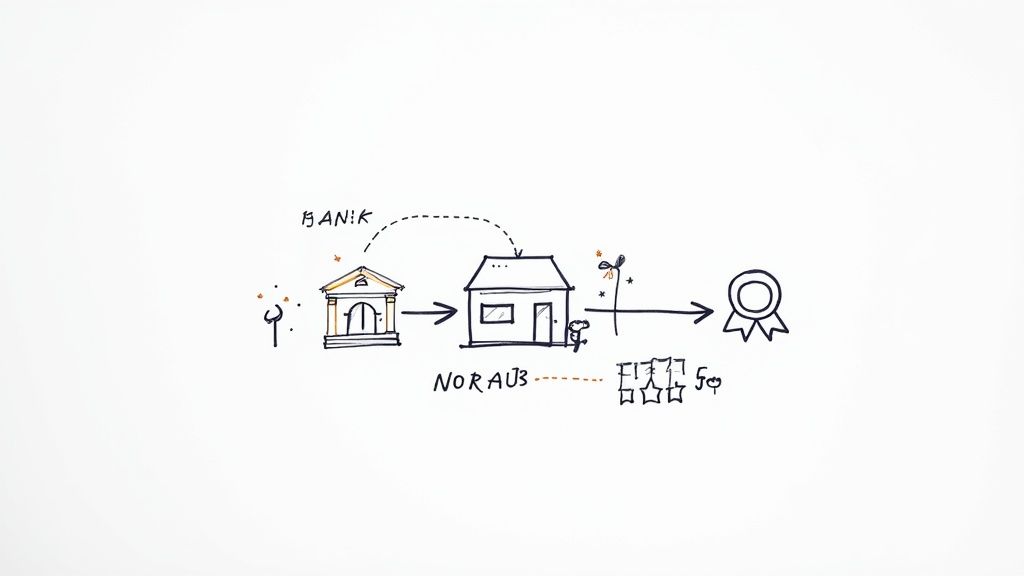
seo for property managers
SEO for Property Managers A Guide to Full Occupancy
Posted on Nov 5, 2025

Think of SEO for property managers not as some complex, technical chore, but as your single most powerful business development tool. Seriously. It works around the clock, connecting you with property owners and tenants at the very moment they need your help. The result? A reliable, hands-off stream of high-intent leads.
Why SEO Is Your Best Business Development Tool
Forget sinking cash into expensive ad campaigns with dicey returns or just hoping for word-of-mouth referrals. A solid SEO strategy transforms your website from a simple online brochure into a digital asset that consistently drums up business.
Instead of you chasing down leads, qualified prospects find you with a simple Google search. This completely flips the script on how you grow your portfolio, shifting your focus from outbound hustling to inbound demand.
When a property owner types "multifamily property manager in Dallas" into Google, they're not just window shopping—they have an immediate, pressing need. Showing up on the first page for that search puts your company right in their line of sight, instantly positioning you as a credible, local authority. It's the digital equivalent of being the most recommended name in town.

Building a Predictable Growth Engine
SEO offers a sustainable and scalable way to attract the right kinds of clients. Paid ads are great, but the leads dry up the second you turn off the budget. A well-ranked website, on the other hand, keeps generating organic traffic and inquiries long-term. This creates a predictable pipeline for growth, which makes financial forecasting and business planning a whole lot easier.
The perks of going all-in on SEO go way beyond just getting more leads:
- Enhanced Brand Credibility: Ranking high in search results builds immense trust. If Google sees your website as a top resource, potential clients are far more likely to feel the same way.
- Reduced Client Acquisition Costs: SEO does require an upfront investment of time and resources, no doubt. But over the long haul, the cost per lead is often significantly lower than paid ads or other marketing channels.
- Market Authority: When you create genuinely valuable content that answers the real questions owners and tenants have, you establish your company as the go-to expert in your local market. This makes the entire sales conversation feel less like a pitch and more like a consultation.
The real magic of SEO is capturing intent. You aren't interrupting someone's day with an ad; you are providing the exact solution they are actively looking for. This means higher-quality leads who are much further along in their decision-making process.
Moving Beyond Technical Jargon
At the end of the day, successful SEO for property managers is less about algorithms and more about deeply understanding your dual audience: property owners and potential tenants.
It boils down to creating a user-friendly website, publishing helpful content that speaks directly to their pain points, and making sure your online presence is dialed in for local searches. It’s about being the best answer, not just a search result.
For property managers looking to free up resources to focus on growth strategies like SEO, checking out the best property management apps can be a game-changer. When you streamline your daily tasks, you have more bandwidth to build a solid digital marketing foundation that will pay you back for years to come.
Finding the Keywords That Drive Contracts

Great SEO for property managers all boils down to one thing: thinking like your ideal client. Before you can win their business, you have to get inside their head and figure out the exact words and phrases they're typing into Google when they're stuck. This isn't guesswork; it's about learning the language of their problems.
Your real goal here is to dig up keywords that signal commercial intent. There’s a world of difference between someone searching for "property management tips" and someone searching for "multifamily property manager in Dallas." The first person is browsing. The second one has a problem that needs solving now. That's the low-hanging fruit you want to grab.
Decoding Searcher Intent
In this business, you’re serving two completely different audiences, and your keyword strategy has to reflect that. You're not just casting one net; you're creating distinct pathways for both property owners and potential tenants to find you.
- Property Owner Keywords: These are your money-makers. Owners are searching for a partner they can trust with their investment. Their searches are almost always service-focused and tied to a specific location.
- Tenant Keywords: While they don't lead directly to management contracts, attracting high-quality tenants is a huge part of your value prop. Ranking for these terms shows you’re a major player in the local market and helps you fill vacancies faster, which makes your owners very happy.
Think about the unique pain points of each group. An owner is losing sleep over ROI, surprise maintenance bills, and legal headaches. A tenant is worried about finding a safe neighborhood, affordable rent, and a place with decent amenities. Your keyword list needs to speak to both sets of anxieties.
The secret to smart keyword research is empathy. Put yourself in their shoes. If I owned a duplex in Austin and was fed up with late-night tenant calls, what would I search for? The answer to that question is your golden ticket.
When you take this balanced approach, you become visible at every stage of the property management cycle. It sends a powerful signal to Google that you're a true local authority, and that helps boost all of your rankings.
Identifying High-Value Local Keywords
Trying to rank for a generic keyword like "property manager" is a losing battle. It's wildly competitive and pulls in a ton of irrelevant traffic from all over the country. The real magic happens when you get specific by combining your service with your location. This is where you can carve out a serious advantage.
You should be laser-focused on building a list of locally-driven phrases. Here are a few patterns that consistently deliver results:
- [Service] in [City/Neighborhood]: e.g., "condo management in South Boston"
- [Property Type] management [City]: e.g., "multifamily property management Phoenix"
- Best property managers in [City]: e.g., "best property managers in San Diego"
Keywords like these are magnets for qualified leads. These are people actively looking for exactly what you do, right where you do it. The conversion rate on these is exponentially higher than on broad, generic terms.
The Power of Long-Tail Keywords
Beyond those core local terms lies a goldmine: long-tail keywords. These are longer, more conversational search phrases, usually three words or more. Individually, they don't get a ton of search volume, but they convert like crazy because they reveal exactly what the searcher wants to know.
Think of them as direct questions your clients are asking. "Property manager" is vague. But a search for "condo management fees in downtown Austin" is coming from someone who is deep in the decision-making process.
Here’s a simple breakdown of how intent changes with keyword length:
| Keyword Type | Example | Searcher Intent |
|---|---|---|
| Head Term | "property management" | Low - Just browsing, early research |
| Local Term | "property manager Miami" | Medium - Starting to look for options |
| Long-Tail Term | "how much do Miami property managers charge for a single-family home" | High - Ready to compare prices and hire |
Targeting these long-tail queries in your blog posts and FAQ pages is one of the smartest things you can do. You’re meeting prospects at the exact moment they’re ready to sign. This targeted strategy is why SEO delivers such a strong return for property managers. Many firms see a 3-5 times ROI within the first year because a single new management contract can often pay for months of your SEO investment. If you want to dive deeper, you can gain insights on property management SEO growth and see the numbers for yourself.
A solid keyword list that blends broader local terms with these highly specific long-tail queries is the engine that will consistently attract the right clients at the right time.
A solid keyword list is your blueprint, but your website is the high-performance machine you build from it. It's not enough to just list your services anymore. Your site needs to be meticulously engineered to attract and convert local property owners.
Think of it as your digital headquarters. When a high-value prospect lands on your homepage, they need to know—instantly—that you're the go-to expert in their specific area.

Craft Pages That Speak Directly to Your Market
One of the most potent strategies in SEO for property managers is building out dedicated pages for each city or neighborhood you cover. A generic "Services" page just doesn't cut it. A potential client in Scottsdale isn't looking for a generalist; they're searching for a local specialist who understands their market.
Get hyperlocal with your service pages. For instance:
- "Gold Coast Chicago Property Management"
- "Short-Term Rental Services in Scottsdale"
- "HOA Management for Dallas Suburbs"
Each page should be a complete resource. Talk about the unique challenges and opportunities in that area, mention local landmarks to build familiarity, and sprinkle in testimonials from clients in that very neighborhood. This approach sends a powerful signal to Google that you are a relevant authority for that location, massively boosting your odds of ranking for those high-intent local searches.
Your website's structure should mirror your service area map. If you serve ten neighborhoods, you should have ten distinct landing pages, each optimized to be the best possible answer for someone searching for services in that specific place.
The Nuts and Bolts of On-Page SEO
On-page SEO covers all the elements on each page of your site that you can directly control. Getting these fundamentals right is non-negotiable for telling search engines what you're all about.
Here is a quick-reference checklist covering the most critical on-page SEO elements for a property management website. Following these best practices will significantly improve your local search rankings and help you connect with more property owners.
On-Page SEO Checklist for Property Managers
| SEO Element | Best Practice for Property Managers | Example |
|---|---|---|
| Title Tags | Start with your primary keyword & location. Keep it under 60 characters. | Austin Multifamily Property Management | Your Company |
| Meta Descriptions | Write a compelling mini-ad. Include a benefit and a call-to-action. | Need reliable multifamily management in Austin? We maximize ROI with expert tenant screening & maintenance. Get a free quote! |
| Header Tags (H1, H2) | Use your main keyword in the H1. Use related keywords in H2 subheadings. | H1: Expert Property Management in Austin, TX |
| URL Structure | Keep URLs clean, readable, and include your target keyword. | yourcompany.com/austin-property-management |
| Image Alt Text | Describe images accurately for screen readers and search engines. | A modern apartment complex managed by [Your Company] in Austin. |
| Internal Linking | Link relevant pages together to pass authority and help users navigate. | Link from a blog post about "tenant screening" to your "Property Management Services" page. |
Getting these small details right can have a massive impact on whether a potential client clicks on your result or a competitor's. A higher click-through rate is a strong signal to Google that your page is a great match for the searcher's query, which in turn helps your rankings.
Your Silent Partner: Technical Health
Technical SEO might sound complex, but for property managers, it really boils down to two critical things: how fast your site loads and how well it works on a phone.
A slow website is a lead killer. Seriously. Research shows that users start bouncing after waiting just 3 seconds. Google knows this, and because they prioritize user experience, they give a ranking boost to faster sites.
Just as critical is your site's mobile performance. The overwhelming majority of local searches happen on a smartphone. If a property owner has to pinch and zoom to read your services, they're gone. They'll hit the back button and you'll never see them again. Your website must have a responsive design that looks and functions flawlessly on any screen size.
Your Unbeatable Local SEO Tool: Google Business Profile
If you only do one thing for your local SEO, make it this: completely and obsessively optimize your Google Business Profile (GBP). This free listing is often the very first interaction a potential client has with your brand, showing up prominently in the local map pack and search results.
Treat your GBP like a second homepage. It's that important.
- Fill out every single section. Services, business description, hours, Q&A—don't leave anything blank.
- Upload high-quality, professional photos. Show off your managed properties (with permission, of course!), your team, and your office.
- Actively solicit reviews. Positive reviews are one of the most powerful local ranking signals. Make it a part of your process to ask every happy client for one.
- Respond to all reviews. Engaging with both positive and negative feedback demonstrates that you care and builds immense trust.
- Use Google Posts regularly. Share blog updates, company news, or special offers. This keeps your profile looking fresh and active.
Optimizing your website is a continuous process of refinement. For those of us in the vacation rental space, these same principles apply but with an added focus on the guest experience and driving direct bookings. To dive deeper into that side of things, check out our detailed guide on how to optimize a vacation rental website for direct bookings, which covers more specialized tactics.
A well-oiled website, combined with a stellar GBP, is the one-two punch that will help you dominate your local market.
Creating Content That Wins Over Property Owners
Having the right keywords and a technically sound website gets your foot in the door. But it's your content that really seals the deal.
Think about it from an owner's perspective: they're searching for a trustworthy partner, not just another vendor. Your content is your first, and maybe only, chance to build that trust before they even think about picking up the phone.
Slapping a list of services on a page just doesn't cut it anymore. You have to prove your expertise by creating genuinely helpful resources that tackle the real-world problems and anxieties that keep property owners up at night. This is a cornerstone of effective SEO for property managers because it cements your reputation as the go-to expert in your market.
Adopting the Hub and Spoke Model
One of the best ways I’ve seen to structure this kind of expertise is the "Hub and Spoke" model. It’s a smart approach that organizes your content logically for both people and search engines, turning your site into an undeniable authority on property management in your area.
Here's the breakdown:
The Hub: This is your big, cornerstone piece of content on a broad topic your ideal client is obsessed with. Think of it as the central pillar. A great example would be a comprehensive guide like "The Ultimate Guide to Investing in Rental Properties in Miami."
The Spokes: These are more focused, shorter articles that all link back to your central hub. Each spoke takes a deep dive into a specific subtopic you mentioned in the hub. Following our example, spokes could be "Navigating Miami's Landlord-Tenant Laws" or "How to Accurately Calculate ROI on a Miami Rental."
This setup creates a powerful, interconnected web of content. For Google, this signals deep authority on a topic. For a potential client, it offers a clear path to get answers to all their questions, keeping them on your site longer and building your credibility with every single click.
The Hub and Spoke model transforms your blog from a random collection of posts into an organized library of expertise. It tells property owners, "Whatever your question is, we have the answer." This is how you build unshakable trust.
Content That Answers Their Biggest Questions
Your content strategy needs to be laser-focused on the actual problems your clients are trying to solve. Get past the generic fluff and dive into the nitty-gritty details that show you truly understand their world. The goal is to create resources that make them think, "Finally, someone who gets it."
Try building content around these critical areas:
- Financial and ROI Concerns: Write about maximizing rental income, breaking down management fees, or sharing practical tips for reducing maintenance costs.
- Legal and Regulatory Hurdles: Create content that demystifies local eviction laws, explains fair housing regulations, or details security deposit requirements in your specific state.
- Tenant Management Issues: Develop guides on effective tenant screening, strategies for dealing with difficult tenants, and advice on lowering vacancy rates.
Creating this kind of practical, problem-solving content is non-negotiable. While data shows that SEO for property management websites can pull in a decent average engagement rate of around 60%, the conversion rate from that traffic often sits at a surprisingly low 1.3%.
What does that tell us? You can get qualified people to your site, but turning them into actual leads requires deeply relevant and persuasive content. This is where a strategic approach like the Hub and Spoke model really shines. You can discover more insights about these property management SEO benchmarks and see exactly why a focused content strategy is so crucial for conversions.
Repurposing Content for Maximum Impact
You don't always need to reinvent the wheel. A truly smart content strategy is about getting the most mileage out of every single piece you create. This saves you a ton of time and makes sure your valuable insights reach a much wider audience across different platforms.
- Turn a detailed blog post into a simple checklist or a downloadable PDF.
- Pull key statistics from a guide and create an engaging infographic for social media.
- Use the main points from a hub article as the script for a short, informative video.
This approach not only hammers your message home but also supports a more holistic digital marketing strategy that goes beyond just your website. By meeting property owners where they are with content in the format they prefer, you build a much stronger, more visible brand.
We dive deeper into how content fits into the bigger picture in our guide to STR digital marketing strategies. By consistently showing up and providing real value, you ensure that when an owner is finally ready to hire a manager, your company is the first and only one they think of.
Building Authority Through Links and Local Trust

Search engines are a lot like people—they trust what others say about you far more than what you say about yourself. This is the whole idea behind off-page SEO. It’s all about building a rock-solid digital reputation that lives outside the four walls of your own website.
When another reputable, local website links to yours, it’s basically a vote of confidence. Google sees this digital nod and starts to see your business as a credible, authoritative player in your local market. This isn't a numbers game; it's about earning quality endorsements that prove you're a legitimate and relevant local expert.
Earning Links as a Local Expert
The phrase "link building" can sound a little technical and intimidating, but for a property manager, it's really just digital networking. The best, most powerful links grow naturally from real-world relationships and activities that embed your business right into the fabric of your community.
Forget about complicated SEO tactics for a minute. Instead, focus on these practical, reputation-building strategies that generate high-quality links as a side effect:
- Sponsor a local event. Whether it’s a neighborhood 5K or the local little league team, sponsorships almost always come with a link from the event’s website. This is an incredibly powerful local signal to search engines.
- Team up with other local pros. Think about co-authoring a blog post with a trusted real estate agent or mortgage broker about the local housing market. When they link back to your site, it's a strong endorsement from a highly relevant industry peer.
- Join your Chamber of Commerce. Most chambers have online directories where they list and link out to their members. This is often one of the first and most valuable local links you can get.
These aren't just one-off tasks for your SEO for property managers checklist; they build real-world brand recognition and position you as a committed leader in your community.
Think of every local partnership as an SEO opportunity. A single link from a respected local source is worth more than dozens of links from random, low-quality websites. It’s always about quality over quantity.
The Undeniable Power of Online Reviews
Beyond links, your online reviews are arguably one of the most critical parts of your digital reputation. For building trust with both Google and potential clients, they are completely non-negotiable.
Platforms like Google and Yelp are where property owners go to vet you long before they ever think about picking up the phone. A steady stream of recent, positive reviews is the social proof that you actually deliver on your promises. According to BrightLocal, a staggering 98% of consumers use the internet to find information about local businesses, and reviews are a massive piece of that puzzle.
Actively Managing Your Reputation
Your online reputation isn't something you can just set and forget; it needs to be actively managed. Being proactive about getting and responding to reviews is essential for building local trust and climbing the search rankings.
Here’s a simple but incredibly effective process:
- Make It Easy to Leave a Review: After a great conversation or experience with a client, send them a direct link to your Google Business Profile review page. The less friction there is, the more likely they'll follow through.
- Respond to Every Single Review: Thank people for their positive feedback, and just as importantly, address negative comments professionally and constructively. This shows you’re engaged and value feedback—a huge trust signal for prospects reading your reviews.
- Showcase Your Best Reviews: Feature glowing testimonials and case studies right on your website. This reinforces the positive signals from third-party sites and can give your on-site conversion rates a nice boost.
At the end of the day, building authority and trust is a two-pronged attack. You need the digital endorsements that come from other local websites and the powerful social proof that comes from a stellar collection of online reviews. Mastering both is what separates the property managers buried on page five from those who own the local search results.
Tracking Your SEO Success and Adapting for Tomorrow
Let's be real: SEO for property managers isn't a one-and-done task. It’s an ongoing process that needs a watchful eye. You have to know if all this effort is actually putting heads in beds and money in the bank. Forget the vanity metrics—we’re focused on what directly impacts your bottom line.
A great place to start is with the free powerhouses: Google Analytics and Google Search Console. These tools are non-negotiable for tracking the key performance indicators (KPIs) that actually matter.
Measuring What Matters
Your main focus should be on numbers that tell a story about business growth, not just how many people landed on your site.
- Organic Traffic Growth: Are more people finding you through a search engine this month than last month? Simple as that.
- Keyword Rankings: Are you climbing the ladder for those money-making keywords like "property management in [Your City]"? To really get granular, looking into the best ChatGPT rank tracker tools can give you a much clearer picture of where you stand.
- Conversion Rate: This is the big one. What percentage of those organic visitors are actually filling out your contact form or picking up the phone? That’s the true measure of your SEO success.
When you start connecting these dots, you can finally see your return on investment. If you really want to get into the weeds, we've put together a full guide on how to measure marketing ROI that will help you tie your SEO work directly to revenue.
SEO is a long game. Don't get bummed out if you don't see massive results overnight. The property managers who win in local search are the ones who consistently track their progress and tweak their strategy along the way.
And things are always changing. The rise of AI-powered search, like Google’s Search Generative Experience (SGE), is shaking things up. SGE often pulls answers directly from different sources, which can disrupt the old model of just driving clicks to your site. To keep up, you can't just optimize for keywords anymore; you have to optimize your content to be seen as the authoritative source that AI systems trust and pull from. To get ahead of these shifts, you can discover more insights about property management SEO trends and start preparing now.
Your Top Property Management SEO Questions, Answered
If you’re digging into the world of SEO for property managers, you’ve probably got a few questions swirling around. Let’s be honest, it can feel like a bit of a black box at first. Getting clear, straightforward answers is the only way to build a strategy you actually feel good about, so let's tackle the questions we hear most often.
How Long Does This SEO Thing Actually Take?
This is always the first question, and the honest-to-goodness answer is: it’s a marathon, not a sprint. SEO is all about building long-term value, not flipping a switch for instant traffic.
While you might see some encouraging signs from local SEO tweaks in as little as 2-3 months, a solid strategy that drives real business usually needs 6 to 12 months to gain serious traction.
Think of it like earning a great reputation in a new town. The first few months are about laying the groundwork—tuning up your site, publishing your first key pieces of content, and making sure all your local listings are in order. The real, compounding growth in organic traffic and signed management contracts comes from sticking with it, month after month.
Can I Do My Own SEO, Or Should I Hire Someone?
You can absolutely do your own SEO. If you have the time to learn the ropes and the discipline to execute consistently, it's definitely possible. But let's be real—it's a complex field that’s always changing, and trying to master it while also running your core business is a massive undertaking.
Bringing in an agency or a consultant who lives and breathes property management SEO gives you a few major advantages right out of the gate:
- Industry Know-How: They already know the keywords and tactics that work for attracting property owners in your market. No guesswork needed.
- Pro-Level Tools: They come equipped with expensive, professional software for deep analytics, keyword research, and rank tracking.
- Dedicated Hours: They can put in the consistent time needed for content creation, link building, and technical tune-ups that you probably can't spare.
For most property managers, the faster, more powerful results an expert can deliver make the investment a clear winner.
The secret to SEO success isn't just knowing what to do; it's doing it consistently. Whether you handle it in-house or hire help, the magic happens when you stick to the plan and let the results compound over time.
What's More Important: Local or National SEO?
For pretty much every property management company out there, local SEO is everything. Your entire business—from the owners you sign to the tenants you place—is tied to a specific geographic area.
Your prospects aren't searching for "property manager"; they're searching for "property manager in Phoenix, AZ" or "condo management near downtown." Your strategy has to be laser-focused on winning those geo-targeted keywords.
Sure, some of your helpful blog posts might pull in traffic from across the country, which is great for brand awareness. But the revenue that grows your business comes directly from dominating the search results in your own backyard.
Ready to stop hoping for referrals and start attracting high-intent property owners directly to your website? hostAI uses advanced AI to create stunning websites and automated marketing campaigns that boost your direct bookings and grow your portfolio. See how leading STR managers are doubling their revenue by visiting https://gethostai.com.